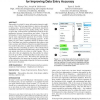306 search results - page 46 / 62 » Answering why and why not questions in user interfaces |
PERVASIVE
2007
Springer
14 years 1 months ago
2007
Springer
We take two paradigms for information systems development, functionalism and social relativism, and apply their assumptions to the evaluation of ambient information systems. Ambie...
UIST
2010
ACM
13 years 5 months ago
2010
ACM
Data quality is critical for many information-intensive applications. One of the best opportunities to improve data quality is during entry. USHER provides a theoretical, data-dri...
CHI
2007
ACM
14 years 8 months ago
2007
ACM
This project aims to further our understanding of the practice of user-centered design (UCD) by observing the argumentation strategies used by designers in faceto-face meetings in...
WCRE
2003
IEEE
14 years 1 months ago
2003
IEEE
There are many reasons why reverse engineering research tools often fail to be evaluated or adopted in industry. Their rough user interfaces and poor interoperability are just two...
AAAI
1998
13 years 9 months ago
1998
We discuss what constitutes an integrated system in AI, and why AI researchers should be interested in building and studying them. Taking integrated systems to be ones that integr...


